What your marriage teaches your child about love

How modelling a strong, loving and caring marriage influences your child's choice of a future partner
The moment you said ‘I do’ was just the beginning. When you get married, you’re not just committing to each other but also committing to being role models for your kids.
The way you love, communicate and resolve conflicts as a couple will shape your childrens’ expectations, their self-worth and their choice of partner in the future. It’s a heavy responsibility, but it’s also an opportunity to empower them with a healthy understanding of love, respect and relationships.
Model behaviour
They say being a role model is the most powerful form of educating. In a research article titled ‘Preparing Children for a Healthy Marriage’ published by Utah State University, children “tend to model the behaviours they learned in their formative relationships in the future”.
Ask yourself: how do you treat your partner in front of your kids? Are you affectionate in front them? Or do you feel like they don’t need to see all of that?
As parents, we need to think of the kids through all of our actions because they learn their core values and principles through us. Remember, those little eyes and ears are watching, listening, learning and absorbing the dynamics of your marriage. They are soaking up every compliment, every loving glance and every compromise that you make. So you need to make sure that you’re setting a good example.
You’re shaping their expectations and influencing the kind of relationships they’ll have in the future.
Fight right
Arguments are inevitable, and you’re bound to disagree with your spouse once or even thrice a day. But are you fighting healthily? Good conflict management means lowering your voice, adjusting your tone and not uttering any curse words or insults. Consider how you argue, because you are modelling how conflict plays out. It will affect your children in the long run and they’ll grow up thinking that’s normal behaviour.
Conflicts should be addressed in a constructive and respectful manner so that the kids learn that disagreements can be resolved without resorting to anger, aggression or manipulation. Healthy conflict resolution teaches them that disagreements can be opportunities for growth and understanding, rather than threats to the relationship.
As your children navigate their own relationships, they’ll be better equipped to handle disagreements and work towards finding solutions that strengthen their bond with a partner.
Time for teamwork
From washing dishes to making the bed, tidying the home and doing laundry together, teamwork in marriage turns even the most mundane tasks into something more meaningful. By working together, you show your kids that marriage is a partnership built on collaboration, cooperation, mutual support and trust — and they learn the importance of working together towards a common goal.
This teamwork approach teaches kids that relationships are a partnership, not a dictatorship. They understand that relationships require effort, compromise and communication. As they grow, they’ll be more likely to seek out partners who share similar values and are willing to work together with them to build a strong, healthy relationship.
Healthy communication
Communication is the key — as cliché as that sounds, it’s true. When mom and dad communicate openly and honestly, they can navigate life’s challenges together, strengthen their bond and create a deeper connection that lasts for a lifetime.
This is also bonus for the kids because it teaches them the importance of expressing feelings, needs and thoughts in a healthy way. It teaches them about active listening, which fosters empathy and compassion. They begin to understand that communication is a two-way street, requiring both parties to be heard and understood. This skillset will serve them well in their future relationships, enabling them to navigate complex conversations and build deeper connections with their partners.
Staying for the kids?
You shouldn’t. We’ve heard this one too many times, where the parents think no matter how terrible their marriage or spouse is, it’s better to just stay in the marriage for the sake of raising their kids together.
The sad reality is that they are doing more harm than good. Studies show that children who grow up within an unhealthy marriage are more likely to end up attracting and selecting toxic partners for themselves in the future.
Break the cycle
If you’re in an unhealthy marriage, it’s not too late to break the cycle. Seeking help, such as couples therapy, can be a positive step towards creating a more positive environment for your kids. Even if you can’t save your marriage, you can save your children so that they don’t have to heal from having you as their parent later on.
This might involve co-parenting in a way that prioritises your kids’ needs, even if you’re no longer in a romantic relationship. By doing so, you can help your kids develop healthier relationship patterns and avoid the toxic behaviours they may have witnessed.
Raise the bar
Mom and dad, you have the power to raise the relationship standards of your kids. By modelling positive behaviour, teaching effective communication and promoting mutual respect, you can help them develop a strong foundation for their future hubby or wife.
Encourage your child to prioritise their own needs, set healthy boundaries and seek out partners who respect and value them. By doing so, you’ll give them the tools they need to build strong and happy relationships that will serve them well throughout their life.
Remember, it all starts with you, so make sure you do your best. Bonus tip: learn your partner’s love language — it makes marriage a little easier.
5 unhealthy love styles
- THE AVOIDER — dodges conflict or difficult conversations, which often leads to unresolved issues and a strained relationship.
- THE PLEASER — prioritises the needs of others over their own, often sacrificing their own well-being and happiness to avoid rejection or conflict.
- THE VACILLATOR — constantly switches between different positions or opinions, often due to indecisiveness or a fear of commitment.
- THE CONTROLLER — tries to dominate or manipulate others, often through guilt, anger or micromanaging, to achieve their own needs or desires.
- THE VICTIM — perceives themself as powerless or helpless, often blaming others or circumstances for their problems, and may seek sympathy or attention.
By: Emma Mbuthuma
Text courtesy of Jet magazine
Related articles

Latest Jet club magazine
We’ve got the latest trends, exciting prizes and exclusive savings just for you!
Jet Club will not pass your details to anyone else. By clicking the subscribe button you confirm you have read and agree to the Jet Club Terms and conditions and Jet Club Privacy Statement.
Subscribe

